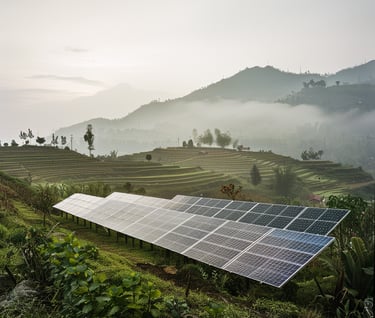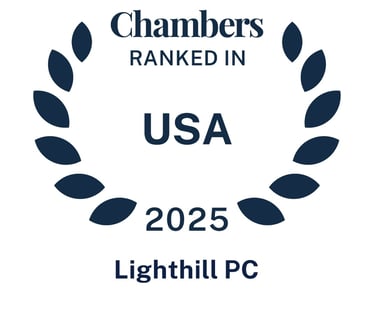US Solar Import Probe's Focus On China Is Misguided
The narrative in the U.S. Department of Commerce's recent anti-dumping and countervailing duty investigations focuses on the apparent Chinese ownership of solar device importers in four Southeast Asian countries — a point that is irrelevant under the controlling statute.


In response to petitions filed in April with the U.S. Department of Commerce and the U.S. International Trade Commission, the Department of Commerce is conducting anti-dumping and countervailing duty investigations of imports of solar cells and modules from Cambodia, Malaysia, Thailand and Vietnam.
The International Trade Commission is separately investigating whether the imports are causing material injury to the U.S. producers of solar cells and modules.
The Department of Commerce investigations were officially initiated on May 14.
The petitions were filed by several U.S. companies including Convalt Energy Inc., First Solar Inc., Hanwha Q CELLS USA Inc. and Mission Solar Energy LLC, supported by Meyer Burger (Americas) Ltd., REC Silicon ASA, and Swift Solar Inc. At the core of the petitioners' claim is a straightforward narrative: The U.S. industry struggles to establish itself because of unfair Chinese competition. But what connection does China have with imports from the four Southeast Asian countries?
The answer is not as straightforward as one might think. Surprisingly, China plays a minimal role in the substantive parts of the petitioners' legal claims.
The petitioners emphasize the Chinese ownership of some producers in four Southeast Asian countries and allege transnational subsidization by the Chinese government. But under the applicable law, nationality of ownership is not a valid consideration, and the transnational subsidy allegations represent only a small part of the entire claim.
These new investigations, legally distinct from previous determinations, perpetuate an anti-China narrative by implication rather than substance.
To grasp the limited role of China in these petitions, one must first understand the nature of anti-dumping and countervailing duties, along with the history of similar trade actions by some of the U.S. producers.
Previous Determinations
In 2011, U.S. producers first brought anti-dumping and countervailing duty allegations against imports of solar cells from China, including Chinese solar modules made from Chinese solar cells.[1] These allegations were followed by additional petitions in 2013 against products from China made with non-Chinese solar cells.[2]
Again, in 2017, U.S. producers sought relief under a separate trade remedy mechanism, initially securing the application of Section 201 safeguard duties to all countries. Subsequently, Canada was exempted from these duties.
In 2022, allegations surfaced that Chinese manufacturers were circumventing anti-dumping and countervailing duties by conducting minor processing operations in the four Southeast Asian countries.
Circumvention in the anti-dumping and countervailing duty context means that the producers and exporters are selling products into the U.S. market that are otherwise outside the scope of any existing anti-dumping and countervailing duty orders, but that nonetheless are later determined to be subject to the orders.
In these earlier anti-circumvention actions, the Commerce Department concluded that five examined companies were circumventing duties on solar cells and modules from China. The department, however, also determined that Hanwha Q CELLS and Jinko Solar Co. Ltd. in Malaysia, and Boviet Solar Technology Co. Ltd. in Vietnam, were not engaged in such circumvention.
Moreover, the Commerce Department determined that no circumvention could occur unless the solar cells were made with Chinese wafers, or the solar modules, laminates and panels were made with three or more Chinese-origin components other than the wafers.[3]
These inquiries and the prospect of additional duties because of circumvention had a significant impact on the industry and its supply chains, leading President Joe Biden to issue Presidential Proclamation No. 10414, which declared a national emergency "with respect to the threats to the availability of sufficient electricity generation capacity to meet expected customer demand."
The proclamation allowed for a 24-month moratorium on the entry of solar cells and modules that would otherwise be considered as circumventing the rules. This moratorium is set to expire on June 6.
In addition, a 25% duty applies to cells and modules from China, including other components used in making solar modules such as tempered solar glass, back-sheets and ethylene vinyl acetate under Section 301 of the Trade Act of 1974, in response to China's acts and policies concerning intellectual property violations.
Moreover, the Biden administration has recently announced that Section 301 tariffs are poised to increase soon, doubling the duties on solar cells and modules from China.
The China anti-dumping and countervailing duty orders, along with the Section 301 duties, already protect the U.S. domestic industry from Chinese competition.
The circumvention determinations extend the China anti-dumping and countervailing duty orders to imports of Chinese solar cells and modules from the four Southeast Asian countries newly under investigation. Section 201 global safeguard duties further shield the industry from global competition.
The doubling of Section 301 duties will increase pressure and push U.S. importers to source non-Chinese solar cells and modules from Cambodia, Malaysia, Thailand and Vietnam. These new petitions aim to address that shift.
The Narrative Misalignment
These new petitions, legally distinct from previous determinations, perpetuate an anti-China narrative despite concerning Cambodia, Malaysia, Thailand and Vietnam. The scope of the anti-dumping investigations, as defined by the petitions, is on products originating from these countries — and not Chinese products or those deemed Chinese under the prior circumvention determinations.
The scope of these investigations, as expressly defined by the petitioners, concern products of Cambodia, Malaysia, Thailand and Vietnam. Their narrative seems to be built primarily on Chinese ownership of some of the producers in the four Southeast Asian countries.
However, whether producers and exporters from the four Southeast Asian countries are owned by or affiliated with Chinese companies does not affect whether those producers and exporters are dumping or selling products that are subsidized. The nationality of company owners has no bearing in U.S. anti-dumping and countervailing duty investigation laws.
Affiliations with Chinese companies played a role in the earlier circumvention case because it could have indicated circumvention of duties on China.
Anti-dumping investigations are about whether producers and exporters sell products in the U.S. market at prices below those sold in their domestic markets or below their constructed value — i.e., costs, expenses and profit — focusing on the pricing behavior and cost of production within the investigated countries.
The issues concerning Chinese producers potentially dumping solar cells and modules, or their products being minimally processed in other countries before entering the U.S. market — and thus circumventing anti-dumping and countervailing duty orders — have been resolved in separate cases.
The current petitions explicitly state that they do not pertain to those previous cases. They include innuendo around the China narrative, but the substantive legal claims concern the four Southeast Asian countries and the solar cells and modules produced there.
Anti-Dumping Duty Investigations: A Speculation
A significant economic consideration is the overcapacity problem which could play a role in the anti-dumping investigation. Overcapacity is an inefficient allocation of resources where an industry produces more than there is demand.
Global overcapacity means that more is produced globally than global demand. The petitioners mention overcapacity in their allegations by quoting Treasury Secretary Janet Yellen's remark that "China's overcapacity distorts global prices."
U.S. anti-dumping law recognizes the concept of a "particular market situation." This term refers to circumstances that prevent a proper comparison of sales prices in the exporter's market, or sales to a third country, to the exporter's prices in the United States. A particular market situation may also exist concerning an input market, which could prevent consideration of a company's recorded costs.
The Commerce Department, in its new regulations, discussed global overcapacity as an example of a particular market situation with respect to a so-called significant input — not the finished product.
Consider that even if there were a global overcapacity of solar cells and modules, it would be lowering the prices both in the Southeast Asian country markets and the U.S. markets, leaving the price discrimination purpose of the anti-dumping investigation intact.
Moreover, because Vietnam is already considered a nonmarket economy by the department, any allegations of a particular market situation would be moot. The petitioners have yet to make an allegation of any particular market situation. Although they mentioned global overcapacity in their petition, global overcapacity of solar cells and modules is not among the examples provided by the Commerce Deparment that may lead to determinations of a particular market situation concerning sales. Should the Commerce Department find a particular market situation with respect to costs, it may address such distortions in its cost calculations. Therefore, the only way for the petitioners to tie the anti-dumping cases — except for the Vietnam case — to China would be through a particular market situation allegation with respect to a significant input — such as wafers or polysilicon if the producer is purchasing Chinese polysilicon to produce the wafers in one of the four countries. However, such developments would concern only a part of what the anti-dumping investigation is about. These potential developments and their magnitude can only be subject to speculation at this point, leaving the anti-dumping investigation currently legally unconnected with China.
Countervailing Duty Investigations: A New Twist
Countervailable subsidies involve financial assistance from foreign governments that benefit the production, manufacture or exportation of goods, and specifically target an exporter, industry or geographic region.
The specificity indicia can be based in the subsidy program law or in fact, such as when recipient enterprises or industries are limited in number.
However, under Title 19 of the U.S. Code, Section 1677(5A)(D)(iii), specificity determinations based in fact "shall take into account the extent of diversification of economic activities within the jurisdiction of the authority providing the subsidy."[4]
These subsidies can appear as discounted loans, tax breaks, direct grants or low-cost rent and are provided by nearly every government. Ironically, U.S. producers also benefit through subsidies under the Inflation Reduction Act.
Normally, countervailing duty investigations focus on subsidies provided by the national government or the local governments of the export country — i.e., not China. However, on the same day the allegations were filed, new Department of Commerce regulations took effect.
Concerned by China's Belt and Road Initiative, or BRI, these regulations allow for duties on products from third countries that may benefit from Chinese subsidies. However, of all the subsidy program allegations raised by the petitioners — ranging from nine to 29 allegations, depending on the country — only three relate to China. The Department of Commerce initiated investigations into only two of these transnational subsidies.
The Three Transnational Subsidy Programs
All three transnational subsidy allegations are essentially the same for all four countries. Of the three allegations, two concern policy lending by Chinese state-owned banks and equity investments through the Silk Road Fund and the China-ASEAN Investment Cooperation Fund, both under the auspices of the BRI and capacity cooperation agreements.
These allegations, however, are very broad and lack much support that manufacturers of solar cells and modules in the Southeast Asian countries received any benefits or that the alleged subsidies were specifically targeted.
The petitioners assert that "project-level financing generally is not reasonably available" and suggest it is likely that foreign manufacturers received financial support from Chinese state-owned institutions or state-controlled BRI investment funds.
In a supplemental response, the petitioners urged the Department of Commerce not to apply its regulations for investigating equity investments; these regulations mandate an explicit allegation that shares were purchased at above-market value.[5]
The department did not initiate an investigation with respect to the equity infusions allegations on May 14.
In its initiation documents, the department did not agree with the petitioners that equity infusions by Chinese banks under the BRI and capacity cooperation agreements should be presumed to confer a benefit. Adopting such a stance would necessitate changing the department's regulations, a tardy move at this stage.
The program allegations struggle with the specificity element required for determinations of countervailability. The allegations do not claim that these programs are specific in law but in fact.
An evaluation of specificity based in fact must be made considering the jurisdiction of the authority providing the subsidy. The BRI and cooperation agreements appear to be broad, aiming to benefit many countries, rather than specific exporters, regions or industries.
After all, according to the petitioners: "As of 2023, China had signed BRI-related agreements with 151 countries, including international capacity cooperation agreements with 40 countries."
Thus, even if the Chinese government had provided nonmarket-based lending to some industries more than others, it could have been attributed to industrial diversification.
To investigate this program, the department will ask for information from China. However, in practice, the Chinese government rarely responds to the Department of Commerce's countervailing duty questionnaires that would lead to an adverse inference of specificity.
The third transnational subsidy allegation concerns the provision of polysilicon by Chinese state-owned polysilicon producers to producers of solar cells and modules in the four Southeast Asian countries.
But, here again, the allegations are broad and give perhaps just enough for the Commerce Department to begin exploring whether the manufacturers purchased polysilicon directly from Chinese state-owned enterprises at prices below adequate remuneration, as arms-length transactions through intermediaries could negate a finding of subsidization of the manufacturers.
The Commerce Department included a recommendation to investigate the policy lending program by Chinese state-owned banks and the provision of polysilicon at less than adequate remuneration as export subsidies. This development is unsurprising because the specificity criteria alleged by the petitioners concern domestic subsidies, as expressly stated in the statute.
Transnational subsidies by definition are not domestic subsidies. Thus, the department appears intent on determining whether these programs are contingent upon or consider export performance.
The Magnitude of the Two Transnational Subsidies
The magnitude of these two transnational subsidy programs, if found countervailable and translated into duties, would be relatively small and, in practical application, nullified by an offset to the anti-dumping duty rate.
In the most recent final results of the countervailing duty administrative review, covering the period from Jan. 1, 2020, through Dec. 31, 2020, the program rates for cooperating exporters for domestic policy lending to the renewable energy industry program ranged from 1.05% to 1.92%.
The provision of polysilicon at a less than adequate remuneration program rate ranged from not being used at all to 0.47%, depending on the exporter.
The overall subsidy rates in the administrative review for China were 10.34% to 18.95%.[6]
Although previous subsidy rates do not guarantee the rates in ongoing investigations concerning different countries and exporters, these rates further suggest the limited role Chinese subsidies play in these countervailing duty investigations.
Even if the department were to find these two transnational subsidy programs countervailable and export contingent, it would have to offset those rates from the anti-dumping rates.
According to the statute, the department reduces the anti-dumping duty rates by the appropriate amount of the export subsidy rates determined in the companion countervailing duty proceeding.[7]
The presumption is that the subsidy contributed to lower-priced sales of subject merchandise in the U.S. by the amount of any export subsidies. The anti-dumping duty offset would nullify the role of the Chinese subsidies that may be inherent in the anti-dumping duty case.
Conclusion
The anti-dumping and countervailing duty allegations currently being investigated have nothing to do with price discrimination by Chinese manufacturers and circumvention of anti-dumping and countervailing duty orders, and only few Chinese transnational subsidies are in question.
Although the petitioners portray the solar industry as the "'poster child' for economic harm caused by extensive transnational subsidization by Chinese authorities of industries in third countries,"[8] the allegations identify only three subsidy programs that could link the manufacturers to China, one of which suffers from meeting a regulatory allegation standard.
Given the Department of Commerce's recent change in regulations, it is likely that it will nonetheless pursue the other two programs vigorously. However, the practical effects of the Chinese subsidies promise to be relatively minimal.
Similarly, in the anti-dumping investigations, particular market situation allegations that could economically attribute some of the dumping behavior by the Cambodian, Malaysian and Thai producers and exporters to China remain speculative.
----------------------------------------------------------------------------------------------------------------------------------------------------------------
[1] Crystalline Silicon Photovoltaic Cells, Whether or Not Assembled into Modules, From the People's Republic of China, 77 Fed. Reg. 73018 (Dep't Commerce Dec. 7, 2012) (amended final determ. & AD order); see also Crystalline Silicon Photovoltaic Cells, Whether or Not Assembled into Modules, from the People's Republic of China, 77 Fed. Reg. 73017 (Dep't Commerce Dec. 7, 2012) (CVD order).
[2] Certain Crystalline Silicon Photovoltaic Products from the People's Republic of China, 80 Fed. Reg. 8,592 (Dep't Commerce February 18, 2015) (amended final determ. AD & CVD orders).
[3] Antidumping and Countervailing Duty Orders on Crystalline Silicon Photovoltaic Cells, Whether or Not Assembled Into Modules, from the People's Republic of China, 88 Fed. Reg. 87,419 (Dep't Commerce August 23, 2023) (final scope and circumvention determin. with respect to Cambodia, Malaysia, Thailand and Vietnam).
[4] 19 U.S.C. § 1677(5A)(D)(iii).
[5] 19 CFR 351.507(a)(7).
[6] Crystalline Silicon Photovoltaic Cells, Whether or Not Assembled Into Modules, from the People's Republic of China, 88 Fed. Reg. 44,108 (Dep't Commerce July 11, 2023) (final results and partial rescission of CVD admin. review; 2020), and accompanying Issues and Decision Memorandum; see also Crystalline Silicon Photovoltaic Cells, Whether or Not Assembled Into Modules, from the People's Republic of China, 88 Fed. Reg. 56,003 (Dep't Commerce Aug. 17, 2023) (amended final results of CVD admin. review; 2020).
[7] 19 U.S.C. § 1677a(c)(1)(C).
[8] See, e.g., Volume VIII, Petitions for the Imposition of Antidumping and Countervailing Duties: Crystalline Silicon Photovoltaic Cells, Whether or Not Assembled Into Modules, from Cambodia, Malaysia, Thailand, and the Socialist Republic of Vietnam: Thailand CVD Petition at 50, dated April 24, 2024 (DOC Investigation No. C-549-852).




